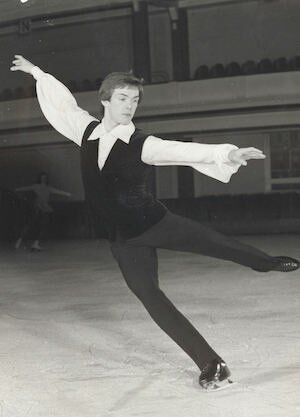
With an estimated audience of 10,000 in attendance at Innsbruck’s Olympic Eisstadion, 26-year-old John Curry took to the ice to perform his five-minute free skate. Leading after compulsory figures and the short program, Curry executed a masterful free program. Though he landed only three triple jumps, it was his interpretation of the music from Leon Minkus’ ballet “Don Quixote,” which was far superior to that of his rivals, that earned first-place marks and gave him the 1976 Olympic title. At the end of his performance, as he waved to his mother across the stadium, as carnations rained down upon the ice.
Born in Birmingham, England on Sept. 9, 1949, Curry’s first passion was dance but when his father refused to let him take classes, Curry started skating. A year later, at age 8, he won his first competition and in 1967 became the national junior champion.
Following his father’s untimely death, Curry, then 16 years old, moved to London to train with Arnold Gerschwiler. In 1970, Curry claimed the first of five senior national titles.
He moved to the United States in 1973 to train with Gustave Lussi and Carlo and Christa Fassi, who then coached three-time U.S. champion and 1976 Olympic gold medalist Dorothy Hamill. His new coaches encouraged him to incorporate dance movements into his programs; in particular those associated with Rudolph Nureyev. Under their tutelage, Curry blossomed. He won his first major international in 1974, a bronze at Europeans. The following year he mined silver at Europeans and claimed his first World Championships medal, a bronze.
In 1976, he narrowly defeated Robin Cousins and claimed the Olympic berth. Curry became the first man in history to win the European, Olympic and World titles in the same season. He was the first man from that nation to win a World title since Graham Sharp did so in 1939.
Despite his success, the British skating establishment was at odds with Curry. The combination of ballet and artistry that he incorporated into his programs had given Curry a distinctive, self-expressive style. “They (the British skating community) told me not to be so graceful,” he later recalled. Just prior to the Games, Curry announced at a press conference that he was gay.
Nonetheless, he had the honor of carrying the flag for his nation at the opening ceremonies in Innsbruk and, upon his return home, was awarded the Order of the British Empire. At a news conference held after the Games, Curry noted he had enjoyed the experience more than he imagined. “It was the perfect ending to my amateur career and a perfect start to my professional career — I hope,” he said.
He retired from competitive skating following the 1976 World Championships to pursue his passion in the dance world. Turning down lucrative offers from established professional ice shows, Curry formed his own dance company because he “could not see the point of spending 12 years training to dress up in a Bugs Bunny suit.”
In 1987 Curry was diagnosed with HIV and in 1991 he was diagnosed with AIDS. He returned to England and spent his remaining years living with his mother. Curry passed away on April 15, 1994 after suffering a heart attack at age 44.
RELATED CONTENT: Skating Pioneers
Footage from the 1976 Olympic men’s medal ceremony